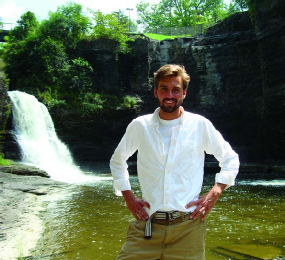On his third try at graduation, a senior ponders his relationship with the University
On his third try at graduation, a senior ponders his relationship with the University
My relationship with Cornell is like a dysfunctional marriage. We fight a lot—sometimes over trivial matters, sometimes deeper issues. We carry grudges, have trial separations, and have been unfaithful to each other more than once. But in the end we always end up back together, if only for the kids.
Spring semester of my junior year, in the midst of some academic and personal turmoil, I dropped out of Cornell for the second time and took off for the Midwest. At the time, I couldn't have been happier; I was eager to leave academia and strike out on my own. Over the next three years, I wandered through nine jobs in fields ranging from cancer research to bagel baking to human organ procurement—and eventually enrolled in the fifth college of my undergraduate career.

Frankly, attending other schools was as much about trying to make Cornell jealous as it was about education. However, much as in human relationships, the gesture felt empty; I was forever comparing my new love to my old one. I'd call any central greenspace "the Arts Quad"—other students would wonder if there was a campus sculpture garden they were unaware of— or say "prelim" instead of "exam," prompting a confused TA to tell me I must not be in his class.
Cornell seemed to get over me quickly; while I was away, it admitted three classes of freshmen who are, for the most part, younger, better looking, and more fit than I am. When I see them strutting around North Campus, they make me feel old and cynical. It's an odd sensation—especially since, in the places I worked during my hiatus from academia, I was always the young guy. Co-workers would come to me with technology questions or ask me to explain pop culture references; some had children older than me. Out there I didn't feel I needed a plan for the future. After all, I was twenty years younger than many of my co-workers, and they didn't have everything figured out.
But ultimately, putting a thousand miles between myself and Ithaca made me nostalgic for Cornell, and last spring I came back for my final two semesters. If all goes according to plan, I'll finally graduate from CALS at the end of this semester—at age twenty-five. I'll earn a BS in interdisciplinary studies, a degree strangely befitting someone who still hasn't figured out what to do with his life.
In returning to campus, I went from being the youngest guy in the office to the oldest guy in the classroom. When I was a freshman six years ago, the fact that I didn't have a Facebook page was slightly eccentric. Now, it makes people ask if I was raised Amish. As I finally scrape together an undergrad degree, my 2008 classmates are completing law school and earning MDs.
Having not set foot in Ithaca for so long, I assumed that walking around campus would be like browsing the museum of my youth. In some respects that's been true, but mostly it's not. Cornell has changed in subtle ways, from the absence of the old Hydraulics Lab—my favorite spot for gorge climbing, it collapsed in early 2009—to the fact that student ID numbers now have an extra digit. Collegetown's three major commodities— booze, coffee, and Asian food—remain the same, but the locations that sell them have shifted. The effect is at once familiar and foreign.
A university is a strange institution—a small city where most of the population turns over every four years. You leave for three years and things change more than you'd think. Familiar campus institutions remain, but they're made up of different people. Seen up close and without the haze of memory, my "Cornell experience" doesn't seem as epic and unique as it once did.
As kids, we always seem to have our eye on the next step. Whatever you're doing this year isn't as important as what it's setting you up to do next year; high school is the gateway to college and so on. Having grown up with this mindset, I assumed that the "real world" was the finish line—where the answers are, where it all comes together and you finally figure everything out. When I left Cornell, I hoped that getting a look at that wider world would help me understand myself and what I want to do with my life. But I fear that I've returned without a clearer picture of where I'm going—just a much longer story about how I got here.
— Mark Fischer '08


